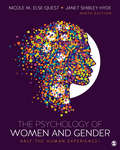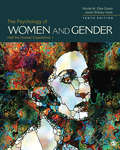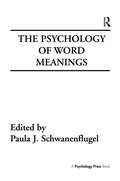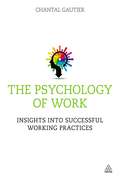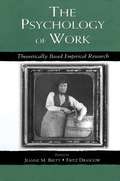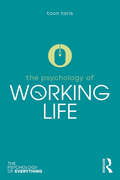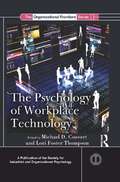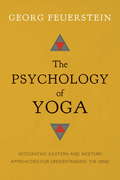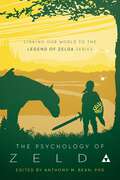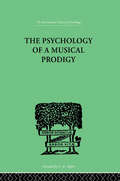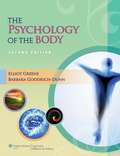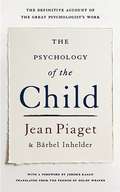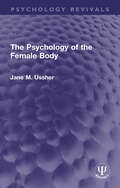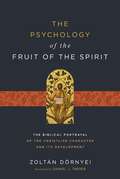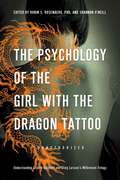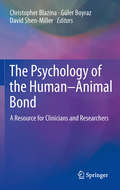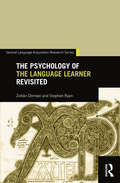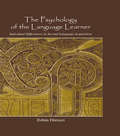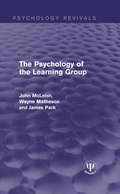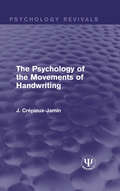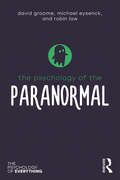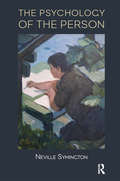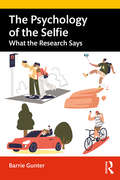- Table View
- List View
The Psychology of Women and Gender: Half the Human Experience +
by Janet Shibley Hyde Nicole M. Else-QuestWith clear, comprehensive, and cutting-edge coverage, The Psychology of Women and Gender: Half the Human Experience + delivers an authoritative analysis of classical and up-to-the-minute research from a feminist, psychological viewpoint. Authors Nicole M. Else-Quest and Janet Shibley Hyde examine the cultural and biological similarities and differences between genders, noting how they are often a result of inequality. The Ninth Edition emphasizes rigorous methodology and reviewing and evaluating empirical evidence, helping demystify the scientific process in this field of study. Hands-on applications through case studies that integrate research from other disciplines give students further experience with key issues. This proven resource equips readers with a strong foundation for understanding the dynamic influences of gender, sexual orientation, and ethnicity in the context of psychology and society, along with strategies for thinking critically about popular culture and using psychological science to improve people’s lives and promote gender equality.
The Psychology of Women and Gender: Half the Human Experience +
by Janet Shibley Hyde Nicole M. Else-QuestA psychology of women textbook that fully integrates transgender research, issues, and concerns With clear, comprehensive, and cutting-edge coverage, The Psychology of Women and Gender: Half the Human Experience + delivers an authoritative analysis of classical and up-to-date research from a feminist, psychological viewpoint. Authors Nicole M. Else-Quest and Janet Shibley Hyde examine the cultural and biological similarities and differences between genders, noting how these characteristics can affect issues of equality. Students will come away with a strong foundation for understanding the dynamic influences of gender, sexual orientation, and ethnicity in the context of psychology and society. The Tenth Edition further integrates intersectionality throughout every chapter, updates language for more transgender inclusion, and incorporates new content from guidelines put forth from the American Psychological Association.
The Psychology of Women and Gender: Half the Human Experience +
by Janet Shibley Hyde Nicole M. Else-QuestA psychology of women textbook that fully integrates transgender research, issues, and concerns With clear, comprehensive, and cutting-edge coverage, The Psychology of Women and Gender: Half the Human Experience + delivers an authoritative analysis of classical and up-to-date research from a feminist, psychological viewpoint. Authors Nicole M. Else-Quest and Janet Shibley Hyde examine the cultural and biological similarities and differences between genders, noting how these characteristics can affect issues of equality. Students will come away with a strong foundation for understanding the dynamic influences of gender, sexual orientation, and ethnicity in the context of psychology and society. The Tenth Edition further integrates intersectionality throughout every chapter, updates language for more transgender inclusion, and incorporates new content from guidelines put forth from the American Psychological Association.
The Psychology of Word Meanings (Cog Studies Grp of the Inst for Behavioral Research at UGA)
by Paula J. SchwanenflugelThis volume contains perspectives from a collection of cognitive scientists on the psychological, philosophical, and educational issues surrounding the meanings of words and how these meanings are learned and accessed. It features chapters covering the nature and structure of word meaning, how new word meanings are acquired in childhood and later on in life, and how research in word processing may tell us something about the way in which word meanings are represented and how they relate to the language processor.
The Psychology of Work
by Chantal GautierThe Psychology of Work integrates psychological theory with personal narrative from global industry leaders, as well as those entering the workforce, to offer tangible insights into the real world of work. It is ideal for students, professionals and anyone with an interest in how successful organizations operate. It charts the development of the field of organizational psychology and provides the key theoretical frameworks. Crucially, it explores how these can be utilised to enhance organizational culture, and why this is so relevant and important in the modern workplace.Through the inclusion of interviews with students, The Psychology of Work reveals what the future workforce expect of the organizations that they are going in to and encourages students reading the book to reflect on what kind of leaders they would like to be. The book is also a valuable resource to support professionals and practitioners, highlighting current working practices and the need for change, offering practical guidance on how to bring the 'humane' back into organizational life.
The Psychology of Work: Theoretically Based Empirical Research (Organization and Management Series)
by Jeanne M. Brett Fritz DrasgowThis edited volume is derived from a conference held in honor of Charles Hulin's contribution to the psychology of work. His research has carefully developed and tested theory related to job satisfaction, withdrawal from work, and sexual harassment. Edited by Hulin's students, The Psychology of Work discusses research in job satisfaction. This research shows that job satisfaction plays an essential role in theories of organizational behavior. Formal models are used, such as item response theory, structural equation modeling, and computational models. Three general and consistent themes in Hulin's research are represented in this book's chapters. The first theme is a focus on broad, general constructs, such as job satisfaction. The virtue of this approach is that a wide range of behavior can be explained by a small number of variables. The second theme involves the examination of the antecedents and consequences of job satisfaction. This theme is increasingly important because it ties research on job attitudes and job behaviors where links are consistently found to social attitudes and behaviors where links are rarely found. The third theme consists of Hulin's interest in the use of formal models to characterize and understand behavior. This volume will be of interest to scholars and students in industrial/organizational psychology, human resources, organizational behavior, and management.
The Psychology of Working Life (The Psychology of Everything)
by Toon W. TarisWhat motivates us to do a good job? When does the pressure of work impact upon our health and well-being? How can employers choose the right candidates? The Psychology of Working Life shows how, whether we like it or not, the way we work, and our feelings about it, play a fundamental role in overall well-being. From the use of psychometrics in recruiting the right candidate, to making working life more efficient, the book illustrates how work in industrialized societies continues to be founded upon core psychological ideas. Motivation and job satisfaction have become recognized as key to job design and The Psychology of Working Life suggests that changing the way we work can impact on our stress levels, overall health, and productivity.
The Psychology of Working: A New Perspective for Career Development, Counseling, and Public Policy (Counseling and Psychotherapy)
by David BlusteinIn this original and major new work, David Blustein places working at the same level of attention for social and behavioral scientists and psychotherapists as other major life concerns, such as intimate relationships, physical and mental health, and socio-economic inequities. He also provides readers with an expanded conceptual framework within which to think about working in human development and human experience. As a result, this creative new synthesis enriches the discourse on working across the broad spectrum of psychology's concerns and agendas, and especially for those readers in career development, counseling, and policy-related fields. This textbook is ideal for use in graduate courses on counseling and work or vocational counseling.
The Psychology of Workplace Technology (SIOP Organizational Frontiers Series)
by Lori Foster Thompson Michael D. CoovertRecent advances in technology have dramatically altered the manner in which organizations function, transforming the way people think about and perform their work. The implications of these trends continue to evolve as emerging innovations adapt to and are adapted by organizations, workers, and other components of the socio-technical systems in which they are embedded. A rigorous consideration of these implications is needed to understand, manage, and drive the reciprocal interplay between technology and the workplace. This edited volume brings together top scholars within and outside of the field of industrial and organizational (I-O) psychology to explore the psychological and organizational effects of contemporary workplace technologies. A special section is included at the end of the book by four experts in the field entitled Reflections and Future Directions.
The Psychology of Yoga: Integrating Eastern and Western Approaches for Understanding the Mind
by Georg Feuerstein"Psychoanalysis itself and the lines of thought to which it gives rise," said C. G. Jung, "are only a beginner's attempt compared to what is an immemorial art in the East"--by which he was referring to the millennia-old study of the mind found in Yoga. That tradition was hardly known in the West when the discipline of psychology arose in the nineteenth century, but with the passing of time the common ground between Yoga and psychology has become ever more apparent. Georg Feuerstein here uses a modern psychological perspective to explore the ways Hindu, Buddhist, and Jaina yogas have traditionally regarded the mind and how it works--and shows how that understanding can enhance modern psychology in both theory and practice.
The Psychology of Zelda: Linking Our World to the Legend of Zelda Series
by Anthony M. BeanIt's dangerous to go alone! Take this (book). For more than 30 years, The Legend of Zelda—which immerses players in a courageous struggle against the shadowy forces of evil in a world of high fantasy—has spanned more than 30 different installments, selling over 75 million copies. Today, it is one of the most beloved video game franchises around the globe. Video game sales as a whole have continued to grow, now raking in twice as much money per year as the entire film industry, and countless psychologists have turned their attention to the effects gaming has on us: our confidence, our identity, and our personal growth. The Psychology of Zelda applies the latest psychological findings, plus insights from classic psychology theory, to Link, Zelda, Hyrule, and the players who choose to wield the Master Sword. In The Psychology of Zelda, psychologists who love the games ask: How do Link's battles in Ocarina of Time against Dark Link, his monstrous doppelganger, mirror the difficulty of confronting our personal demons and the tendency to be our own worst enemies? What lessons about pursuing life's greater meaning can we take away from Link's quests through Hyrule and beyond the stereotypical video game scenario of rescuing a Princess (Zelda)? What do we experience as players when we hear that familiar royal lullaby on the ocarina, Saria's spirited melody in the Lost Woods, or the iconic main theme on the title screen? How do the obstacles throughout Majora's Mask represent the Five Stages of Grief? What can Link's journey to overcome the loss of the fairy Navi teach us about understanding our own grief and depression? Why are we psychologically drawn to the game each and every time a new version becomes available even when they all have a similar storyline? Think you've completed the quest? The Psychology of Zelda gives you new, thrilling dungeons to explore and even more puzzles to solve.
The Psychology of a Musical Prodigy (International Library Of Psychology Ser.)
by Revesz, GFirst published in 1999. Routledge is an imprint of Taylor & Francis, an informa company.
The Psychology of the Body (LWW Massage Therapy and Bodywork Educational Series)
by Elliot Greene Barbara Goodrich-DunnThe Psychology of the Body provides massage therapists, bodyworkers, and other professionals who use contact with the body with a greater understanding of the psychological issues that can arise from using touch in their therapy sessions. This new edition continues to provide a crucial basis of knowledge for students, recent grads, and experienced therapists alike regarding the emotional impact of effective therapy. The book describes the connection between the body and the mind, how touch affects this connection, the client's emotional reaction and release, and how to respond to the client in an appropriate manner. With a new, more colorful layout, this new edition has 50% more content and has been fully revised to address the latest science around this topic. For instructors, prepare your students to appropriately identify, understand, and respond appropriately to all aspects of the therapeutic relationship, including the phenomenon of emotional release, dealing with boundaries, effective interpersonal communications, and a body-based approach to ethics. Furthermore, in-text features aim to help students apply their learning to actual practice. Teaching resources like power point presentations, lesson plans, and tests with answer keys are available.
The Psychology of the Child
by Jean Piaget Barbel InhelderPiaget’s influence on psychology has been profound. His pathbreaking investigations and theories of cognitive development have set child psychology moving in entirely new directions. His bold speculations have provided the inspiration for the work of others. His studies have been the subject of many books and countless articles. And, significantly, his influence has spread to other disciplines and is having an ever-growing impact on the general culture at large.Here Jean Piaget, with the assistance of his long-time collaborator Bärbel Inhelder, offers a definitive presentation of the developmental psychology he has elaborated over the last forty years. This comprehensive synthesis traces each stage of the child’s cognitive development, over the entire period of childhood, from infancy to adolescence.
The Psychology of the Female Body (Psychology Revivals)
by Jane M. UssherFirst published in 1989, The Psychology of the Female Body examines the role of the female body in women’s identity and experience. She discusses how key events such as menarche, menstruation, pregnancy, and the menopause affect women’s lives, and looks at the ways in which the female body and reproduction have been used to confine and control women. She puts forward psychological evidence to refute many of the myths surrounding women’s bodies, highlighting how empirical evidence shows that, contrary to what stereotypes suggest, women are not victims of their biology. This book will be of interest to students of psychology, sociology, gender studies and women’s studies.
The Psychology of the Fruit of the Spirit: The Biblical Portrayal of the Christlike Character and Its Development
by Zoltán DörnyeiFor centuries, the fruit of the Spirit has rightfully served as a wellspring of reflection on the virtues that epitomize the Christian life and character-building. However, the notion of the fruit of the Spirit is not limited solely to forming the biblical foundation of ethical living.Psychologist and theologian Zoltán Dörnyei argues that if we understand the nine attributes collectively as a concise portrayal of the ideal Christian self, this approach places the notion of the fruit of the Spirit at the intersection of several important theological themes, such as being conformed to the divine image, the gradual advancement of the kingdom of God, and new creation. In The Psychology of the Fruit of the Spirit, Dörnyei offers a scholarly exposition of the relevant theological content associated with the fruit of the Spirit. Complementing his theological reflections with findings from the field of psychology, he brings expertise in both psychology and theology to bear on this important biblical concept. His integrated perspective helps to uncover the full meaning and theological potential of the fruit of the Spirit by helping to clarify the nature of its nine facets, defining broader psychological dimensions that underlie the fruit, and offering practical lessons for cultivating it in the Christian life.
The Psychology of the Girl with the Dragon Tattoo: Understanding Lisbeth Salander and Stieg Larsson's Millennium Trilogy
by Lynne McDonald-SmithLisbeth Salander, heroine of Stieg Larsson's The Girl with the Dragon Tattoo and its sequels, is one of the most compelling, complex characters of our time. Is she an avenging angel? A dangerous outlaw? What makes Salander tick, and why is our response to her—and to Larsson's Millennium trilogy—so strong? In The Psychology of the Girl with the Dragon Tattoo, 19 psychologists and psychiatrists attempt to do what even expert investigator Mikael Blomkvist could not: understand Lisbeth Salander. What does Lisbeth's infamous dragon tattoo really say about her? Why is Lisbeth so drawn to Mikael, and what would they both need to do to make a relationship work? How do we explain men like Martin Vanger, Nils Bjurman, and Alexander Zalachenko? Is Lisbeth just as sexist and as psychopathic as they are? What is it about Lisbeth that allows her to survive, even thrive, under extraordinary conditions? How is Lisbeth like a Goth-punk Rorschach test? And what do we learn about ourselves from what we see in her?
The Psychology of the Human-Animal Bond
by Güler Boyra Christopher Blazina David Shen-MillerThere have been dramatic increases in the financial, emotional, and psychological investment in pets over the past four decades. The increasing importance of animal companions in people's lives has resulted in growing emphasis on the human-animal bond within academic literature. This book introduces practicing and emerging professionals to vital subject matter concerning this growing specialty area by providing an essential framework and information through which to consider the unique contextual backdrop of the human-animal bond. Such contexts include a wide array of themes including: issues of attachment and loss, success and frustration with making and sustaining connections, world views regarding animal ethics, familial history of neglect or abuse, and cultural dynamics that speak to the order of things between mankind and nature. Adopting a contextual stance will aid mental health professionals in appreciating why and how this connection has become a significant part of everyday life for many. As with any other important clinical dynamic, training and preparation are needed to gain competence for professional practice and research. To this end, an ensemble of international experts across the fields of psychology and mental health explore topics that will help both new and established clinicians increase and understanding of the various ways the human-animal bond manifests itself. Perspectives from beyond the scope of psychology and mental health such as anthropology, philosophy, literature, religion, and history are included to provide a sampling of the significant contexts in which the human-animal bond is established. What brings these divergent topics together in a meaningful way is their relevance and centrality to the contextual bonds that underlie the human-animal connection. This text will be a valuable resource that provides opportunities to deepen one's expertise in understanding the psychology of the human-animal bond.
The Psychology of the Language Learner Revisited (Second Language Acquisition Research Series)
by Zoltan Dornyei Stephen RyanOver the past decade, the focus of inquiry into the psychology of SLA has shifted from the analysis of various characteristics within individuals towards a greater consideration of individuals’ dynamic interactions with diverse contexts. This revisit of the bestselling The Psychology of the Language Learner reflects on these developments by challenging some of the assumptions upon which the original text was based, maintaining the familiar structure of the original, while situating the discussion within a very different theoretical framework. Written in a lively, accessible style, the book considers how the field has evolved and maintains a keen eye on the future, suggesting exciting new directions for the psychology of SLA. The Psychology of the Language Learner Revisited will appeal to students and researchers in a wide range of disciplines, including applied linguistics, second language acquisition, modern languages, and psychology.
The Psychology of the Language Learner: Individual Differences in Second Language Acquisition (Second Language Acquisition Research Series)
by Zoltán DörnyeiResearch results over the past decades have consistently demonstrated that a key reason why many second language learners fail--while some learners do better with less effort--lies in various learner attributes such as personality traits, motivation, or language aptitude. In psychology, these attributes have traditionally been called "individual differences." The scope of individual learner differences is broad--ranging from creativity to learner styles and anxiety--yet there is no current, comprehensive, and unified volume that provides an overview of the considerable amount of research conducted on various language learner differences, until now.Each chapter in this new volume focuses on a different individual difference variable. Besides a review of the relevant second language literature, Zoltán Dörnyei presents a concise overview of the psychological research involving each topic. A key concern for the author has been to define the various learner factors as measurable constructs and therefore the discussion includes a summary of the most famous tests and questionnaires in each domain.A wide range of readers will benefit from this book--students in linguistics, applied linguistics, modern languages, and psychology programs; second language teachers participating in in-service training courses; and researchers in second language acquisition and psychology.
The Psychology of the Learning Group (Psychology Revivals)
by James Park John McLeish Wayne MathesonOriginally published in 1973, this work takes a hard look at the claims made for the small group as a learning medium (lecture, structured discussion, ‘sensitivity’, training groups etc.). Various theories of group dynamics, leadership function and learning process are looked at critically on the basis of actual research findings. It was intended for students of social psychology and anyone teaching or training to teach at Further Education level at the time, and will still be of interest in its historical context today.
The Psychology of the Movements of Handwriting (Psychology Revivals)
by J. Crepieux-JaminOriginally published in 1926, this title is a summary in English of the works of the great French graphologist Jules Crépieux-Jamin. He was recognised at the time in France as the first authority on the subject of graphology, but was less well-known in England and America. This title brought his work to the English speaking world and he went on to be known as one of the most important exponents of graphology.
The Psychology of the Paranormal (The Psychology of Everything)
by David Groome Michael Eysenck Robin LawCan mediums communicate with the dead? Do people really believe they’ve been abducted by aliens? Why do some people make life decisions based on their horoscope? The Psychology of the Paranormal explores some commonly held beliefs regarding experiences so strange they can defy an obvious scientific explanation. The book explains how psychologists have conducted experiments to provide insight into phenomena such as clairvoyance, astrology, and alien abduction, as well as teaching us fundamental truths about human belief systems. From debunking myths about Extra Sensory Perception, to considering whether our lives can truly be fated by the stars, The Psychology of the Paranormal shows us that however unlikely, belief in the paranormal will continue to be widespread.
The Psychology of the Person
by Neville SymingtonThis new title, from a distinguished psychoanalyst, will inspire both those in the psychoanalytic field, and the general reader.'In this book the author attempts to sketch out a "Psychology of the Person". The definition of "person" implies that no two people, even identical twins, are the same. Although this is obvious and no sensible person would quarrel with such a view, yet many terms are used that imply that there is a sameness between two or more people. For instance, it is often said that one individual is identified with another which, in ordinary language, means that he or she makes him or herself the same as the other, yet this is an impossibility. So, what is a person? How is a person different from someone who is not a person? This book sets out to answer these questions.
The Psychology of the Selfie: What the Research Says
by Barrie GunterThe Psychology of the Selfie provides a comprehensive overview and analysis of research on the significance of selfies, offering insights into the topic from a psychological perspective and examining important issues such as body image, self-objectification, mental health and psychological benefits. Selfies are a worldwide phenomenon. Although dismissed by critics as a sign of self-absorbed narcissism, they are also a social currency that maintains and reinforces friendships, a feedback loop for self-identity affirmation, a promotional tool for gaining social influence, and a method for preserving memories of life events. In this book, Barrie Gunter expertly explores the psychological underpinnings of the contemporary global phenomenon of "selfies", from the historical roots and meteoric rise due to technical advancements, to the different personality types of selfie-takers, to social relationships, to group and personal identity. Looking at both the psychological nature and impact of selfies, this book reviews different psychological outcomes for selfie-takers, both positive and negative, and the growth in psychological and physical problems that can sometimes arise. Presenting a comprehensive analysis specifically of selfie behaviour, this book is an essential reference for students and researchers in communications and media, journalism, information studies, psychology and sociology, as well as anyone with a general interest in the phenomenon.
